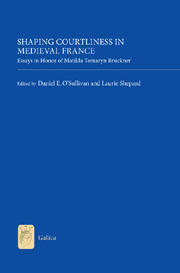Book contents
- Frontmatter
- Contents
- List of Illustrations
- Acknowledgements
- Introduction
- Matilda Tomaryn Bruckner: A Bibliography
- Part I Shaping Real and Fictive Courts
- Part II Shaping Courtly Narrative
- Meraugis de Portlesguez and the Limits of Courtliness
- The Art of “Transmutation” in the Burgundian Prose Cligés (1454): Bringing the Siege of Windsor Castle to Life for the Court of Philip the Good
- Thomas's Raisun: Désir, Vouloir, Pouvoir
- Humanimals: The Future of Courtliness in the Conte du Papegau
- A Matter of Life or Death: Fecundity and Sterility in Marie de 139 France's Guigemar
- Le Roman de la Rose, Performed in Court
- Part III Shaping Women's Voices in Medieval France
- Part IV Shaping the Courtly Other
- Envoi
- List of Contributors
- Index
- Tabula Gratulatoria
- Already Published
Thomas's Raisun: Désir, Vouloir, Pouvoir
from Part II - Shaping Courtly Narrative
Published online by Cambridge University Press: 05 May 2013
- Frontmatter
- Contents
- List of Illustrations
- Acknowledgements
- Introduction
- Matilda Tomaryn Bruckner: A Bibliography
- Part I Shaping Real and Fictive Courts
- Part II Shaping Courtly Narrative
- Meraugis de Portlesguez and the Limits of Courtliness
- The Art of “Transmutation” in the Burgundian Prose Cligés (1454): Bringing the Siege of Windsor Castle to Life for the Court of Philip the Good
- Thomas's Raisun: Désir, Vouloir, Pouvoir
- Humanimals: The Future of Courtliness in the Conte du Papegau
- A Matter of Life or Death: Fecundity and Sterility in Marie de 139 France's Guigemar
- Le Roman de la Rose, Performed in Court
- Part III Shaping Women's Voices in Medieval France
- Part IV Shaping the Courtly Other
- Envoi
- List of Contributors
- Index
- Tabula Gratulatoria
- Already Published
Summary
In an important contribution to the interpretation of Thomas's version of the Tristan romance, Matilda Bruckner built on previous critics’ discussions of structural patterns in the romance, in particular the obsessive recourse to doubling and the continual oscillation between images of unity and duality, one and two, coupling and separation – neatly encompassed, for instance, in the repeated use of the verb partir, and its nominal derivates, which can mean either “to leave, to separate, to divide” or its opposite, “to share” – but extended the framework decisively by including the gestures of the narrator figure in the mix. The latter's participation in this oscillating pattern suggests that there is no single conclusion we can draw about how he, and by extension Thomas, feels about his fictional characters and their actions. As Bruckner puts it succinctly, “[Thomas] can neither endorse nor condemn, but – to the best of his limited ability – only tell.
Space does not permit a full discussion of the critical situation to which Bruckner was responding, but suffice it to say that Jean Frappier's forceful restatement of the “courtly” foundation of Thomas's work, his articulation of the work's ideology of fine amor, “la religion de l'amour … principe d'une éthique et d'une foi,”
was then, and remains today, an unavoidable point of reference, most recently for those who disagree with Frappier's self-proclaimed idealistic stance (“la foi de Thomas dans l'idéal des ‘fins amants'”4).
- Type
- Chapter
- Information
- Shaping Courtliness in Medieval FranceEssays in Honor of Matilda Tomaryn Bruckner, pp. 107 - 122Publisher: Boydell & BrewerPrint publication year: 2013



